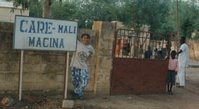 I worked with CARE from 94-97 in Mali, first in Dire, then in Macina, both location at the border of the river Niger. I missed the whole thing about the introduction of the internet there, as we did not even have a telephone connection. We had radio contact with the other CARE offices. The mail from the Netherlands would arrive via the Dutch embassy whenever there was a car coming up from Bamako. Visitors who came up and 'forgot' the mail would never be able to make it up. But important information would travel amazingly fast between villages!!
I worked with CARE from 94-97 in Mali, first in Dire, then in Macina, both location at the border of the river Niger. I missed the whole thing about the introduction of the internet there, as we did not even have a telephone connection. We had radio contact with the other CARE offices. The mail from the Netherlands would arrive via the Dutch embassy whenever there was a car coming up from Bamako. Visitors who came up and 'forgot' the mail would never be able to make it up. But important information would travel amazingly fast between villages!!I found a very good article about recent developments at CARE with regards to knowledge management. For the past two years CARE has been engaged in various initiatives guided by the Learning and Organisational Development Unit in Atlanta. The article http://www.km4dev.org/journal/index.php/km4dj/article/viewFile/16/36 talks about a pilot to create two CoPs with members from CARE offices in India, Bangladesh, Nepal, Vietnam, Cambodia, Laos and Sri Lanka. It highlights the fact that a development organisation like CARE is highly distributed so that it is not likely that spontaneous communities of practice will spring up, so it tries to look for a balance between design and emergence. Trying to create social identity and encouraging the use of narrative language.
Since this type of development organisations operate under tight resource constraints, immediate value in areas of strategic importance is needed. CoPs need to effect an organisational transformation as knowledge sharing is not the norm. Project priorities typically encourage a narrow, dedicated approach. So participation in a CoP will also be a personal transformation for members as they begin to articulate what they bring to the work, rather than focussing on the execution of the project logframes. The solution tried in this case is to create a single, intense, facilitated face-to-face event, bringing together participants working on common themes. A structured approach, called the 5 D-model was used (discover, dream, design, document, disseminate) adapted from the appreciative inquiry approach. The idea is that individuals can not engage in a CoP unless they explore their own journey around their practice, and lots of story-telling is used. There is not yet enough data to say whether these communities will thrive, but the idea is that the intense workshop will form a core group which will allow for expansion.
In my own experience, it is difficult to work with a concept of 'voluntary' membership in CoPs in development organisations with distributed offices if the CoP relies on intense workshops as there will issues of budgets, travel approval, etc. So there is a need to design diversified ways of participating outside the workshops, or virtual exchanges. (the paper does not talk about this aspect)

1 comment:
I had not read that KM4Dev journal article till now and it was really interesting. The language of the paper is based on the Appreciative Inquiry methodology, which could be very generative for distributed CoPs as they dream their community into reality.
Post a Comment